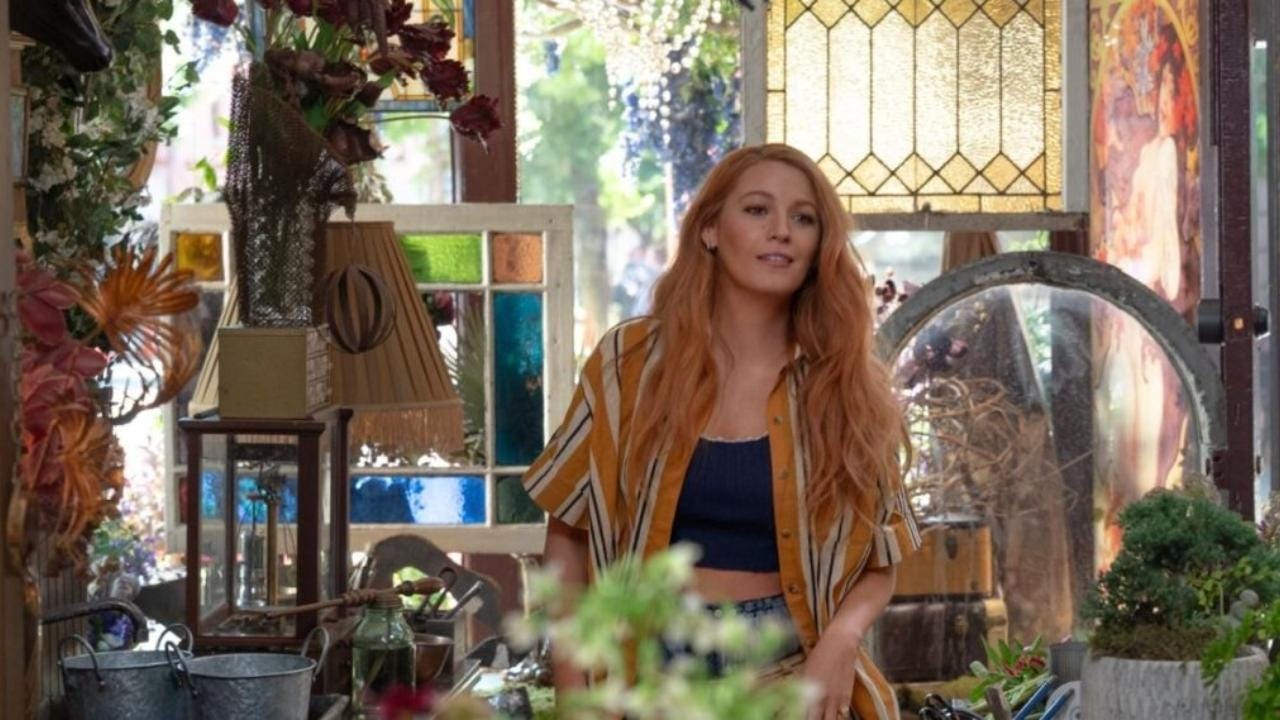I’ll be honest, I didn’t particularly want to see It Ends With Us. I knew it was about a woman who was caught in an abusive relationship, but the rom-com trappings were kind of a turn-off, especially with the movie being over two hours. Seeing as the average rom-com is about an hour and a half, what could It Ends With Us possibly need two hours plus change for?
As circumstances would have it, though, I had some Fandango points burning a hole in my Rewards screen, so there we go.
For the first half of the first act or so, It Ends With Us is a pretty typical romance, although it seems to move kind of fast. Boston florist Lily Bloom meets neurosurgeon Ryle Kincaid, things get steamy pretty quickly, they sing karaoke, there’s a montage or two, Lily and Ryle exchange plenty of banter, and they seem blissfully happy. In the hospital, while Ryle’s sister, Allysa, her husband, Marshall, and their new baby look on, Ryle proposes to Lily. In another minute they’re married.
That’s where the tropes end, though. While she was growing up Lily watched her dad beat her mom, and her relationship with Ryle turns out to be abusive as well. At first it all seems innocent, with Ryle “accidentally” giving Lily a black eye in his haste to get a burning fritatta out of the oven. They both laugh it off as no big deal.
There is, however, a bit of a complication. Lily’s high school boyfriend, Atlas, also lives in Boston and owns a restaurant, and he can see immediately that something isn’t right with Ryle and Lily’s relationship. As things get worse, he makes himself available to Lily, hoping she’ll get free of Ryle. Atlas also saw his mom beaten by her various boyfriends, but when he said something his mom kicked him out of the house. Lily’s dad kicked Atlas around when he found Lily and Atlas in bed together. So yeah, there’s a ton of history there.
After seeing It Ends With Us, I don’t begrudge the movie its ponderous length because it has a lot to unpack, but even then it skims over important details, particularly the layered insidiousness of a typical abusive relationship. When Lily gets the black eye, for instance, it’s hard to tell if Ryle hit her on purpose or not because it all happens so fast.
I found myself filling in the blanks, though, because I recognized what was going on. It was pretty visceral. When Ryle pushes Lily downstairs during an argument, he makes a great point of telling her that she accidentally fell and he’s there to help her. He repeats it over and over until she says it back to him. That’s textbook gaslighting.
Full disclosure: I myself was in an abusive relationship with a guy I dated off and on for about four years in college, only in my case the abuse was verbal and emotional instead of physical. What made it even harder was that the guy was bipolar and ran very hot and cold. One minute he was like an octopus and the next minute he didn’t want to be seen with me. Even though it was crappy not knowing where I stood, I lived for the good moments.
Eventually the guy and I did break up, but it was more due to circumstances than anything, as he was off on a year-long mission trip to Haiti. It was enough to break the cycle, though, because when he came back he asked if I wanted to get back together and I couldn’t bring myself to say yes.
As it turned out, he had already met the woman who would be his wife, and my saying no freed him up to get together with her. He’s since passed away from brain cancer, but a couple of years before he died we were able to meet and clear the air in a beautiful bit of forgiveness and closure.
Even so, it was tough seeing It Ends With Us. Anyone who has ever been in an abusive relationship may not react well to the subject matter, even if all is forgiven. It’s almost like PTSD. The ending, which I won’t ruin, is pretty heartening, and I appreciated that the movie allowed for the passage of time when it came to Lily moving beyond her abuse and finding freedom again.
From a story standpoint, though, the presentation is definitely a little wobbly, particularly in terms of the characters’ points of view. As Lily is inside the abusive relationship, we don’t need to have anything shrouded in mystery. What she experiences should be on full display.
The movie leaves tons of questions unanswered, such as, what happens to Atlas’s mom? When did Lily’s dad start beating up Lily’s mom? What caused Ryle to become abusive? Was Lily’s dad abused himself? Was Lily’s mom? These are important questions, because it’s all too common for people who were abused by family members to jump into an abusive relationship with their significant other, even if the signs aren’t apparent at first.
I have to wonder how much the movie will make sense to someone who hasn’t been in an abusive relationship or is looking to avoid being in one. It Ends With Us could be pretty important if it was somewhat less cryptic and focused less on romantic tropes.
It Ends With Us is currently in theaters. Rated PG-13.
My grade: B
Principal Cast: Blake Lively, Justin Baldoni, Jenny Slate, Hasan Minhaj, Brandon Sklenar, Kevin McKidd, Amy Morton, Alex Neustaed, Isabela Ferrer, Robert Clohessy, Robin S. Walker, Emily Baldoni, Adam Mondschein, Caroline Siegrist, Carolyn Siegrist, Robyn Lively, Megan Robinson, Steve Monroe, Daphne Zelle.
Directed by Justin Baldoni.
Written by Christy Hall and Colleen Hoover.




